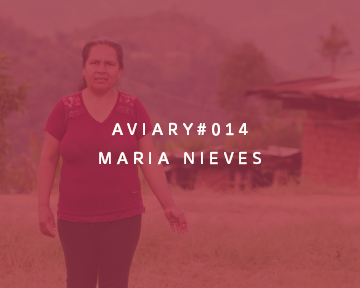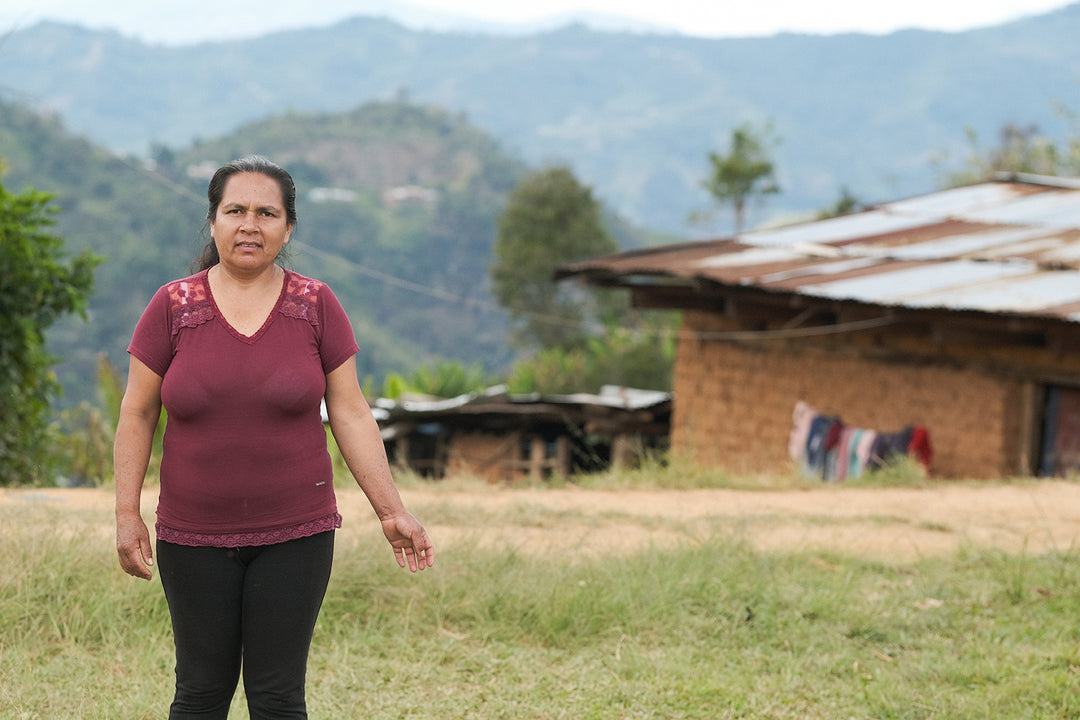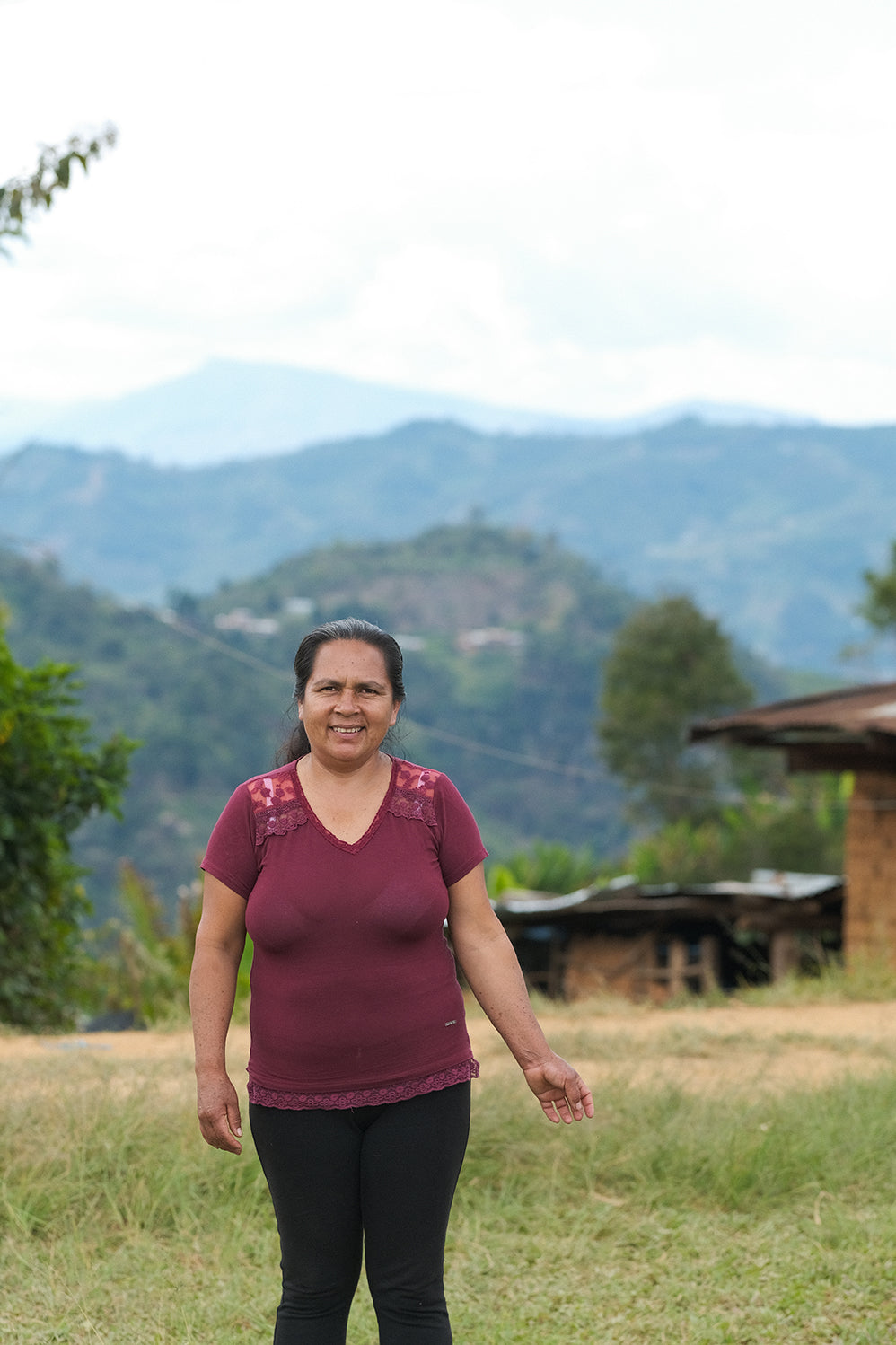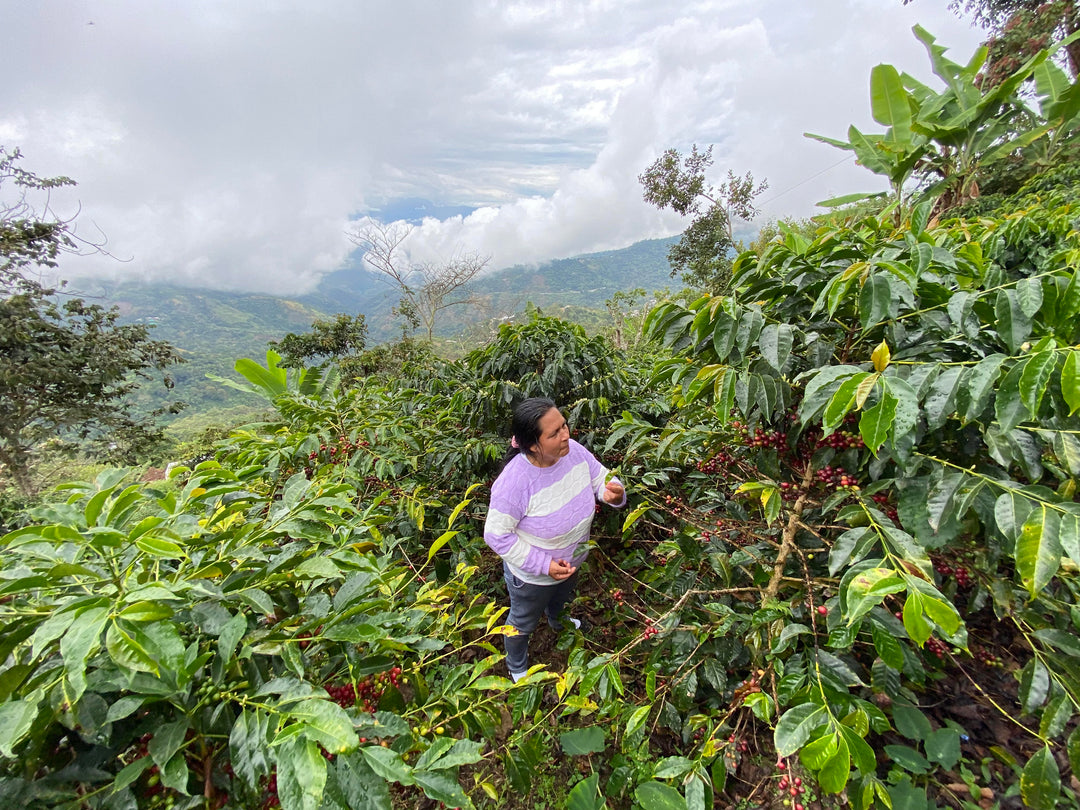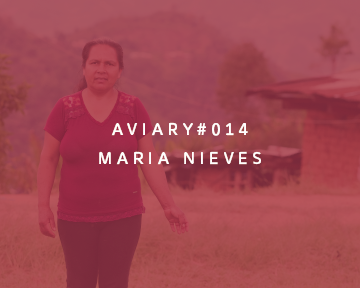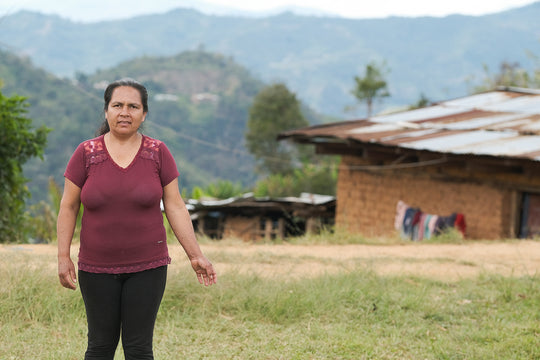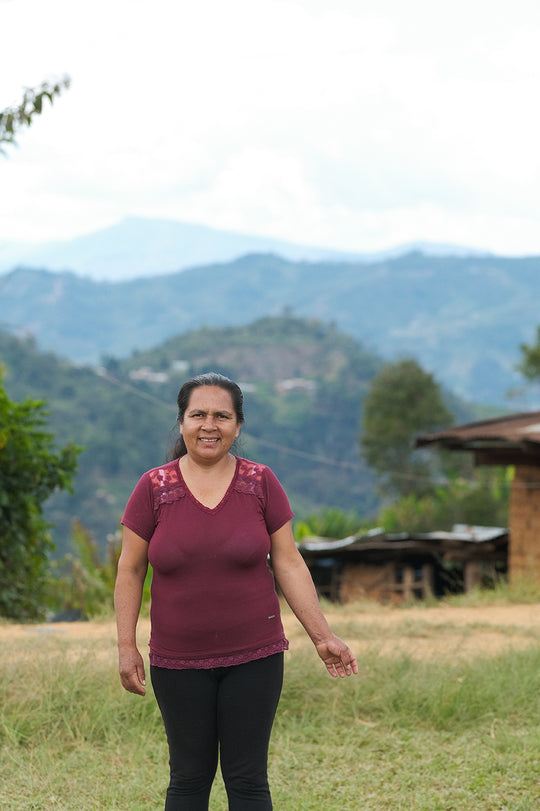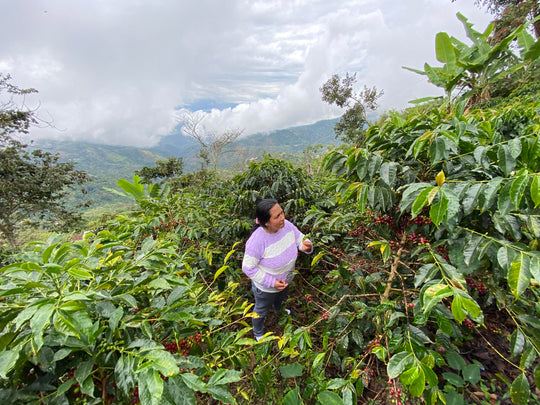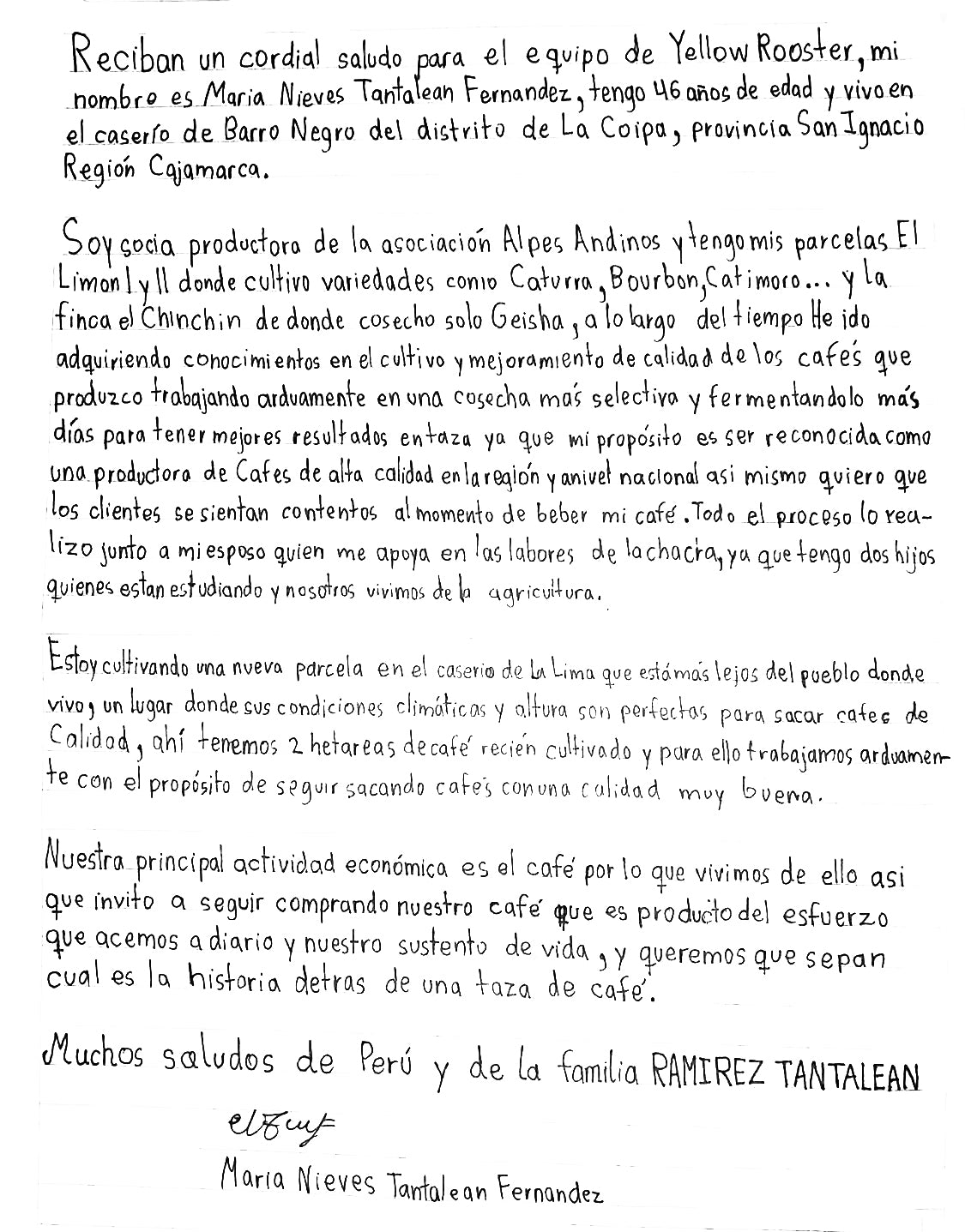014 - Maria Nieves
- Free U.S. shipping
2025 FREEZER SALE UPDATE (2025-12-17):
From Christopher: We're once again rehydrating this coffee for the freezer sale—using vacuum to better homogenize moisture in the lot ahead of roasting in the hopes of reducing cup variance. As the Roest P3000 uses inlet as its control schema, we will be roasting this one manually to ensure that it roasts evenly—rehydrated coffees tend to require significantly more energy in the middle of the roast to drive off excess moisture.
The fifth coffee of our 2025 season continues this year's exploration of non-Panamanian Geshas and comes to us from the producer of one of Aviary's first releases: Maria Nieves. Like Nancy Mendoza, Maria planted Gesha seeds that came to Peru via Costa Rica in an effort to improve her family's prosperity through the cultivation of high-quality specialty coffee.
From Christopher: "The first year of production of Maria Nieves' Gesha trees resulted in a coffee that was not only the highest-scoring coffee of all coffees I bought in 2023-2024, but also one of my favorite coffees of Aviary's first season. Ahead of the 2025 season, I committed to purchasing Maria's coffee again—my third purchase through Yellow Rooster, and second from Maria Nieves Tantalean Fernandez, whose leadership of Asprocafe Alpes Andinos ensures a fair price for the members of the cooperative.
"When we buy coffee year-over-year, we help to mitigate risk for producers and create stability. Though Aviary's purchasing volume was small, the high premium paid to Maria helped to offset a season of overall lower yields.
"The chaos of the universe often makes itself part of the profile of the coffees we enjoy, and the story of this coffee is no different. Harvest and export in Peru in 2024 came during a particularly tumultuous period. Lower yields and a rapidly-rising market created not only liquidity challenges but also led to defaults for many cooperatives in the country. These problems delayed exports—as did huge waves that struck the Peruvian coastline during peak export season.
"When this coffee did eventually make its way to the Port of New Jersey, three months late, it had been exposed to heat, humidity and long transit times—all of which are detrimental to quality. I'd paid a premium for a coffee that arrived faded. I immediately vacuum-sealed and froze the coffee at -20ºC as a way to protect it from further degradation until it was ready for release.
"This situation, I believe, is when roasters show not only their character but their skill. I noted paper flavors in the cup—a hallmark of fade—but rather than rejecting the coffee based on quality, forcing the importer to liquidate at a loss, I used rehydration and roasting techniques that I'd developed to render this coffee as close as possible to its former glory—which had presented with notes of bright raspberry, tangerine and jasmine."
This coffee was roasted May 5, 2025 and again on December 18, 2025.
TASTING NOTES: Bright raspberry, tangerine and jasmine
ROAST: Light, to improve solubility and accentuate the tangy acidity of this coffee and present its fruited character as ripe and juicy while mitigating fade.
ACIDITY: Bright and articulate citrus acidity
FUNK: Very little; some slight jammy blackberry/blueberry but presents as bright and ripe
FOR FANS OF: Washed gesha; women producers; year-over-year relationships; roasting and green handling techniques; second chances
FARMGATE PRICE: Initially 4,650 soles per quintal of parchment
FOB PRICE: $9.35 per lb
LANDED PRICE: $16.90/lb after quality bonus
Coffee in Peru is grown primarily by smallholders who either process cherry to dried parchment themselves or deliver cherry to a cooperative for centralized processing. Because this coffee grows on Maria's farm and she processed it herself, her costs are associated not only with the maintenance of her farm and production, but harvesting and drying as well.
At the time of the purchase of this parchment from Maria, the exchange rate was 1 USD = 3.70 soles. The standard unit of measurement in Peru, a quintal, is the equivalent of 55.2 kg. The price per kg of parchment is therefore 84.2391304 soles per kg, which, assuming an typical milling performance is the equivalent of $12.93 per lb of green coffee. On top of that, Alpes Andinos charged $0.90 per pound for export expenses related to logistics, processing, packing, commissions, administrative fees and sampling.
Upon evaluation of the pre-shipment sample, however, both Aviary and importer (Yellow Rooster) scored the coffee exceptionally well, resulting in an adjustment to the payment to Maria with an addition of a quality bonus.
In 2024, harvest in Cajamarca fell far below prediction during the same months that the C-market began its ascendance. This drove up local pricing and export pricing, creating substantial competition locally.
This coffee was exported through the cooperative that Maria leads, Alpes Andinos, which provided warehousing and milling as well as export services for her coffee.
Gesha grown at 1850 masl using organic methods by Maria Nieves at El Chinchin in Barro Negro, Cajamarca, Peru; selectively hand-picked and sorted in September 2024; fermented in cherry for 12 hours; pulped and floated; fermented in tile tanks under water for 24 hours; washed; dried on raised beds under shade for 20-25 days; exported through ASPROCAFE; imported by Yellow Rooster
This coffee is roasted light to improve its solubility and highlight its florality and acidity as a way to embrace the best qualities present. I recommend resting it for 3-4 weeks from its roast date for filter brewing and 4-5 weeks for espresso-style preparation (though you may wish to try it earlier to enjoy how the coffee changes and opens over time).
As filter, I prefer a ratio of 1:17 using low-agitation methods of extraction resulting in 22-23% EY.




